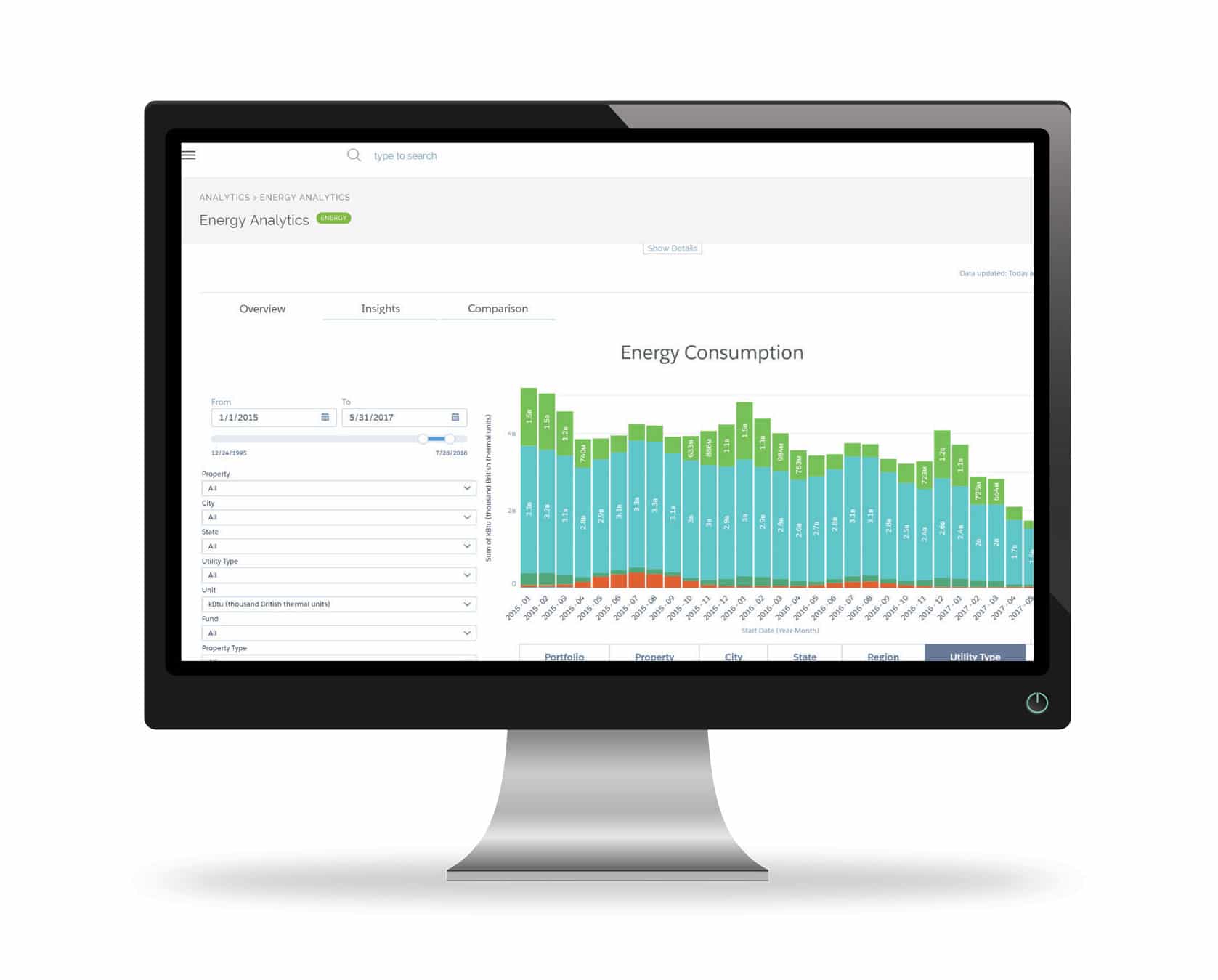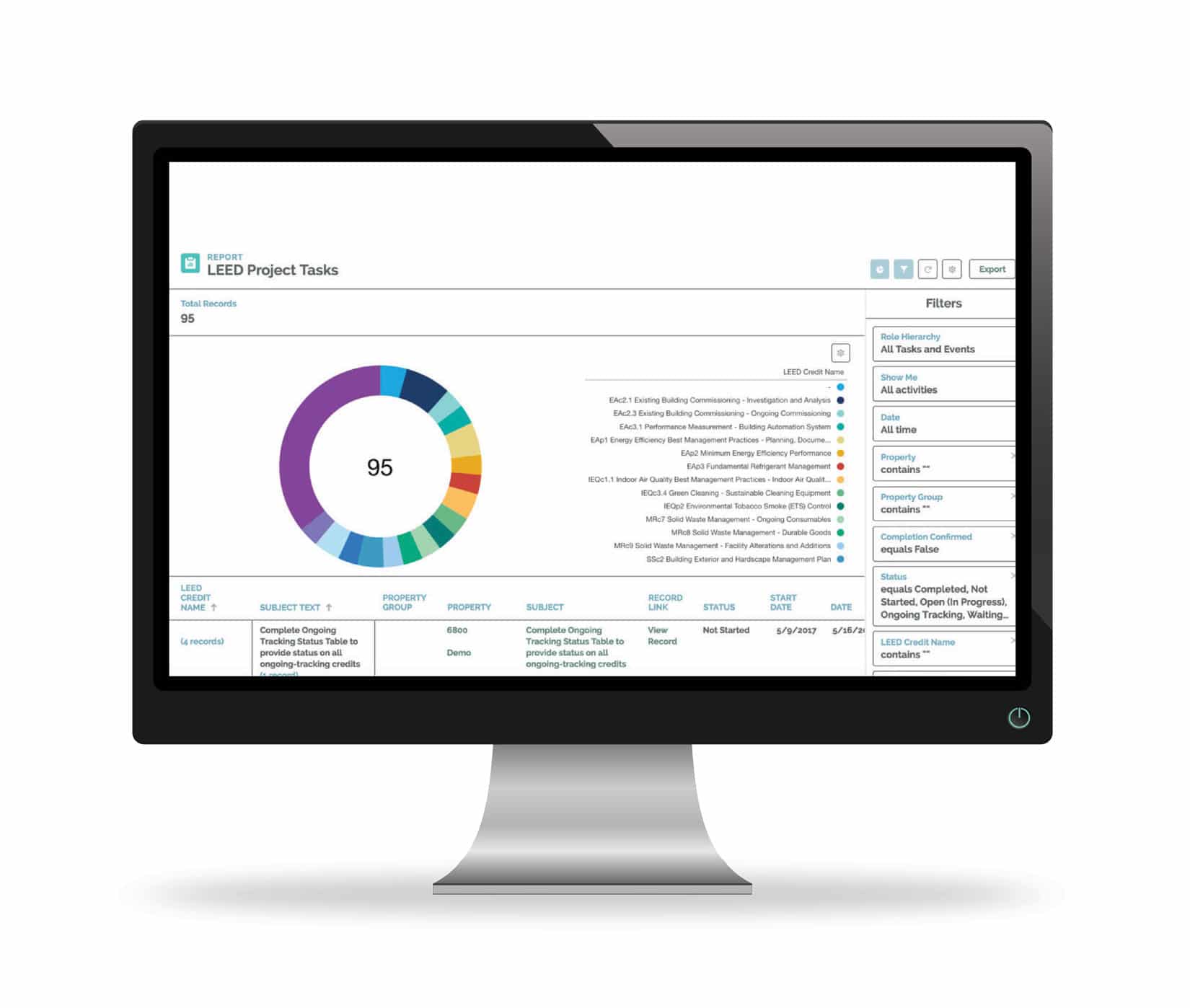
Adam Morris and Brian Mavraganes provide consulting services that save time, money, and energy. [Photo: Christopher Free]
Drowning in building data, but getting nowhere with energy savings? Option One Energy says leave the number-crunching to them.
Energy use is the single largest expense for owners of commercial real estate, comprising around one-third of the total operating budget on average. And according to the U.S. government, the electricity consumed in offices, hotels, and other commercial properties represents about 20% of the nation’s greenhouse gas emissions. Option One Energy, an energy management and consulting company with nationwide service, has honed a unique formula for dialing down both of those numbers.
While most large commercial real estate developments include building automation features, such systems are not always living up to their potential for energy reduction. In older developments, building automation systems are likely to be completely outdated, and smaller developments often lack this sort of infrastructure entirely. But that doesn’t mean there aren’t ways to extract data about building energy usage—the prerequisite for devising a plan to reduce it—and achieving massive savings on monthly bills, all while giving cities a needed boost in the fight against climate change.
“Building owners and facilities managers often lack the time and wherewithal to wade into these details themselves,” says Adam Morris, president of Option One Energy. “Unfortunately, that means they’re missing out on a lot of savings.”
Morris is an expert in establishing energy management information systems (EMIS)—the data-driven infrastructure that enables greater efficiencies—which the U.S. Department of Energy has found to reduce energy consumption by 10 to 20%. The Institute of Real Estate Management has found that EMIS produce cost savings of up to $0.47 per square foot. Morris and his business partner Brian Mavraganes routinely find “energy management opportunities” of this magnitude once they’ve dug into the data of their clients, which range from regional restaurant franchises to large Real Estate Investment Trusts (REITs) and sporting facilities.
“It not only makes sense from a business perspective,” says Morris. “As inhabitants of the Earth, we have a responsibility to take care of it—and that means making sure our buildings are running at their optimum potential.”

The U.S. Department of Energy has found that energy management information systems reduce energy consumption by 10 to 20%. [Screenshots: Courtesy of Option One Energy]
Getting Granular with Building Data
Data is useless if it does not produce actionable insights—which it certainly doesn’t do on its own. Option One Energy provides a Certified Energy Manager to each client who sifts through data from individual buildings, and across large portfolios, to produce a customized action plan. There are several steps to the process.
The first step includes a review of current and historic energy usage, utility invoices, and contracts with service providers. Data may be extracted directly from building automation systems, through utility companies, or even through optical character recognition (OCR) of the client’s past utility bills. Based on this initial analysis, Option One Energy recommends a series of actions designed to cut costs and energy use quickly, which may include anything from changing light fixtures to changing energy suppliers. In the former case, Option One Energy’s sister company, Green Scope Solutions, a lighting retrofit expert, takes the baton to provide seamless implementation of recommended cost-saving features.
The latter case requires other forms of expertise. In the era of deregulated energy markets, one important role of an energy manager is to navigate the web of rates, regulations, tariffs, and available incentives, which vary drastically from city to city and state to state. Option One Energy’s experts work strategically to facilitate bids from energy suppliers, involving price, products, terms, customer service, and billing options, on behalf of each client. The goal is to put together a package that best suits the unique needs and context of each building and portfolio.

Certified Energy Managers sift through data to produce customized action plans. [Screenshots: Courtesy of Option One Energy]
“I’ve found that all too often portfolio managers are paying far too much for utilities, simply because they lack the time and expertise to negotiate more favorable terms and to take advantage of opportunities they may not know exist,” Morris says. Mavraganes adds, “We take the guesswork out of the equation, using our proprietary data analysis process and software systems to ratchet down overall energy use, as well as the cost per kWh.”
But that is only the beginning of the relationship. Once theses initial measures are implemented, Option One Energy’s powerful analytic software continues to track building data, alerting the energy manager assigned to each client of aberrations that represent system errors that need to be remedied, as well as highlighting changing trends in energy use over time. No building’s energy needs are static, and in today’s dynamic commercial real estate market, things are changing faster than ever—which is why it makes sense to hire a professional to stay on top of things.
In the long term, Option One Energy’s cloud-based platform acts as a turnkey service—not just for energy management, but for invoice automation, benchmarking, budget projections, Energy Star compliance, and sustainability reporting and certifications—while expert staff provide ongoing oversight, fine-tuning the system over time and enabling portfolio managers to take advantage of new opportunities as they arise.
“Our approach is to put all building data and energy management needs under one umbrella,” Morris says. “That’s really important because there are thousands of moving parts that need to be coordinated. Clients have often come to us with three or four different companies handling their data, and are pleased to find an opportunity to bundle it all into one service. Streamlining these complex processes makes everyone’s life easier and ensures that buildings are reaching the optimal level of energy performance.”
Overcoming an Epic Energy Management To-Do List
A skilled energy manager is a specialist in using data analytics to drive down usage and cost. But they need to understand a wide range of building technologies, and be able to converse with experts in those fields, to do their job effectively. It’s the very reason Option One Energy’s services are in demand across the country: By consolidating data from every aspect of a building’s operations, they are able to tweak the system toward the desired result. Below are the areas of expertise the Association of Energy Engineers (AEE) requires for Certified Energy Managers.
- Codes and Standards
- Energy Accounting & Economics
- Energy Audits and Instrumentation
- Electrical Systems
- HVAC Systems
- Motors and Drives
- Industrial Systems
- Building Envelope
- CHP Systems and Renewable Energy
- Fuel Supply and Pricing
- Building Automation and Control Systems
- High Performance Buildings
- Thermal Energy Storage Systems
- Lighting Systems
- Boiler and Steam Systems
- Maintenance and Commissioning
- Energy Savings Performance Contracting and Measurement & Verification
Read more about Option One Energy here.
